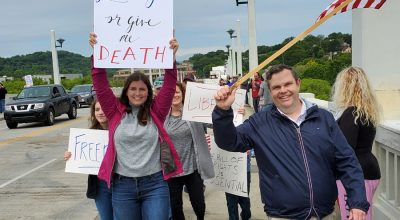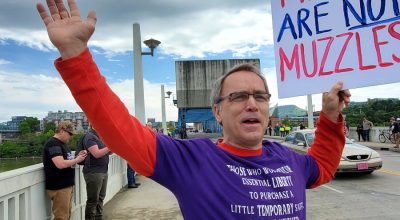


Chattanooga city council tables a plan Tuesday to arrest residents for violating CDC guidelines about “social distancing” during the CV-19 panic that has put the city under so-called emergency orders.
Jerry Mitchell indicates the bill strikes a negative note when the city is getting ready to end the clampdown on business.
By David Tulis / NoogaRadio 92.7 FM
“This ordinance arrived on the agenda with no one from city council’s sponsorship,” Mr. Mitchell says. “Had a meeting with the mayor today, and he told me that he did not ask for this to be put on the agenda — as a matter of fact, he is busy planning reopening o Chattanooga, which, hopefully, if the citizens of Chattanooga keep doing the great job they’ve been doing, that can happen sooner rather than later — hopefully, very, very soon.”
Mr. Mitchell says the concept “didn’t follow the rules to be on our agenda,” and so is not open for review.
Councilwoman Carol Berz says if the bill “is inappropriately on the agenda right now” that the language should be tabled. All the members voted to table it.
The bill would have updated the civil emergency sections of city code. The ordinance says that in a state-defined civil emergency,
[A]ny person violating any provision of the proclamation or orders related to said civil emergency issued by the mayor, or any official hereinbefore authorized to proclaim a civil emergency, may be issued a citation to Chattanooga City Court, where said person may be subject to a fine not to exceed fifty dollars ($50.00), plus court costs, for each violation [emphasis added].
The bill makes people liable for obeying “the laws of the state” (clear enough), “regulations” of health officials and “excecutive orders” under the CV-19 or other medical emergency. The ordinance defines duties of police as follows:
The police department shall enforce a strict observance of the laws of the state and the City, any sanitary regulations promulgated by the state board of health or the county director of health, and any executive orders issued by the governor of the state or the mayor of the City relating to the prevention or control of infectious, contagious or malignant diseases.
City avoids offending people
City council is accustomed to writing vague and illegal ordinances and standing on legal quicksand — as in its ban on Airbnb in half the city and its violation of key constitutional rights, starting with the right to be free from capricious and arbitrary acts.
Council is also accustomed to ignoring clear black-letter law, such as the Tenn. Code Ann. § Title 55, motor and other vehicles. This law it stands on when it has generally no business to stand on it and enforce it. Title 55 is the tax and regulatory body of law enforced by the Tennessee highway patrol. It pertains to motor carriers and truckers. Very little of it is adopted by the city as ordinance.
In the tabled ordinance, the city would have enforced draconian rules from Gov. Bill Lee and mimickry by Mayor Andy Berke, none of which are statutes properly passed by the general assembly. Orders to “stay at home” are unconstitutionally vague as law, and unenforceable because they deny equal treatment among the people in the state. “Social distancing” guidelines are just that — guidelines. They are not criminally nor civilly enforceable, though practically they have great weight.
They have great weight with added criminalization power because people are generally willing to comply and get along, and to avoid either citation, threat of arrest, or arrest under the ordinance. The ordinance posits a mixed jurisdiction: quasi-civil, quasi-criminal. Under what standard is a trial in city court held — criminal (beyond reasonable doubt) or civil (preponderance of the evidence)?
City courts are largely civil in operation, informal, justice of the peace summary justice venues in which the feeling or goodwill of the judge control, not real rules of law and real law. Such an ordinance might have fed that casual venue of jurisprudence, making light of constitutional liberties of the people.


